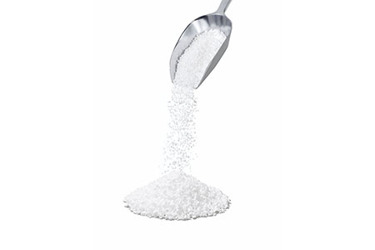The Caking Challenge: Are Granulated Materials A Good Way To Overcome It?
By Thomas Briel

It’s a familiar scenario: opening a package of bulk material that’s been in storage for a while only to find it has formed clumps, caked together, or – at worst – even completely solidified. A lot of biopharma businesses have learned to simply deal with this irritation. The question is, can they afford to – and is there any way to avoid it?
During biopharmaceutical manufacturing, buffers, salts, and stabilizing chemicals are used in multi-ton quantities. Handling bulk powders on this scale can be a real challenge, and a lot depends on the plant’s schedule and capacity. During storage, compounds like potassium chloride, glycine and urea – commonly used to prepare buffer solutions – naturally cake and solidify due to their chemical properties, which can make them even more difficult to handle on this scale. The level of caking can be hard to predict before opening, as it depends on the transport and storage conditions. Dust formation and laborious weighing further hamper manufacturing efficiency, and can even delay or interrupt processes, impede quality, and pose safety risks to operators.
Caking costs
All of this has an economic impact that you’d think would be obvious but is all too easy to overlook. For businesses that rely on just-in-time, flexible handling of chemical raw materials, delays are not an option – speed, flexibility, quality and cost are paramount. Manually de-caking solidified blocks of bulk powder wastes valuable time and poses a serious risk of injury to the operator. When products are caked, emptying the primary packaging is made that much more difficult, sampling and weighing are almost impossible, and then there’s the risk of process delay or interruption. As a result, total cost of ownership can greatly increase.
Unfortunately, current anti-caking solutions tend to be inadequate and time-intensive, merely addressing the symptoms without preventing caking in the first place. This is especially the case for chemicals prone to heavy caking. Avoiding prolonged storage is one option, but this can be difficult to ensure. What if there were a technological solution to the caking challenge?
Get unlimited access to:
Enter your credentials below to log in. Not yet a member of Bioprocess Online? Subscribe today.
